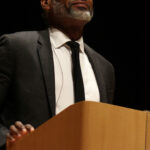Certain people used the Bible to advocate the injustice of Apartheid. In fact, a national government did the same. These people included some Reformed Christians. Reformed is a ‘branch’ of Christianity that especially takes the Bible seriously. In other words, some people who took the Bible seriously used the Bible to promote Apartheid. How then can we trust the Bible as God’s Word to us?
The Apartheid example exposes a far broader issue. We could replace ‘Apartheid’ with ‘patriarchy’ or ‘hatred of homosexuals’ or ‘domestic violence’ or ‘Colonialism’—any situation, historical or contemporary, where individuals or a whole nation wielded the Bible to justify ungodly attitudes or actions against others. And because of the Bible being applied in this way, some people reject the Bible.
Abuse Does Not Negate Proper Use
Anthony Bradley, an African-American theologian, in his book Liberating Black Theology deals with a situation similar to ours where some white American Christians used the Bible to promote the slave trade. But he responds by saying that to reject the Bible because of misuse is a non sequitur: a conclusion or statement that doesn’t logically follow from what comes previously. In other words, to conclude we should reject the Bible does not logically flow from the issue of the Bible being used, in our case, to justify Apartheid. Abuse does not negate proper use.
Bradley illustrates the principle. Imagine (horribly!) that a white racist driving a red car deliberately runs over a black person. Now, besides care for the black person, our focus is to see the white racist brought to justice, right? The problem is the white racist. Not the red car. However, using the illustration, to reject the Bible because some professing Christians or even a government misused the Bible, is like banning all red cars.
The fundamental problem isn’t the Bible! It’s the abusers of the Bible – in distinct instances as individuals, or in systematic ways as nations. And the solution isn’t to dismiss the Bible (ban red cars). Instead, the solution involves seeing the Bible faithfully interpreted—taking it on its own terms.
The fundamental problem isn’t the Bible! It’s the abusers of the Bible – in distinct instances as individuals, or in systematic ways as nations.
But now we have an issue.
What is the faithful interpretation of the Bible?
Certain white Afrikaner Reformed Christians and the Apartheid government interpreted the Bible to justify Apartheid. At the same time, other white Afrikaner Reformed Christians told them they were abusing the Bible. Black and international Reformed Christians agreed: in 1982, a motion at the World Alliance of Reformed Churches to see Apartheid declared a heresy was passed and Apartheid was declared contrary to the teachings of the Bible.
So, what do we do? We have two sides both interpreting the Bible but coming to very different conclusions regarding, in this case, Apartheid. One side was in the minority (for Apartheid) and the other in the majority (against Apartheid). But it’s not always safe to judge a faithful interpretation by crowd sourcing public opinion. So, how do we know which side faithfully interpreted the Bible?
Here are two brief tips:
1. Your interpretation must be consistent with the Bible overall
For instance, Apartheid fundamentally dehumanised black people on the basis of race. But firstly, races (plural) is not necessarily a biblical category. There are different ethnicities and nations and cultures, yes, but only one human race, not races. Secondly, and more importantly, the Bible opens declaring the human race (singular) created in the image of God. By implication, every human being (regardless of their ethnicity) has inherent worth and dignity. So, to justify Apartheid from the Bible based on race tears against this basic and substantial biblical doctrine of how God created us with equal human dignity.
2. Your interpretation must be consistent with the Jesus of Scripture
Socio-economically Jesus had little to nothing. Ethnically Jesus was brown skinned from the meeting place of Asia and Africa. Politically he was oppressed. Physically he was tortured and beaten before succumbing to the Roman version of lynching. Can you imagine that Jesus telling a black man he wasn’t allowed to use the same toilet? In some ways, Jesus simply by sheer nature of his birth and location and upbringing had more in common with a black person under Apartheid, than with a white person from the leafy suburbs of Apartheid Pretoria.
Far more importantly however, consider the bigger picture: Jesus died for all people. ‘Race’ doesn’t enter the picture. To trust a ‘white’ Jesus who died for white people only is to fool yourself with an imaginary Jesus. Fundamentally the cross reminds us of the equality of all humanity: we are all equal in our sin, and so we are all equal in our need for salvation through Christ alone. There is no boasting, there is certainly no elevating of one part of humanity over another – certainly not on the invented basis of race. We are all in need of Jesus.
Far more importantly however, consider the bigger picture: Jesus died for all people. ‘Race’ doesn’t enter the picture.
The Bible and Apartheid
Those brief tips for faithful interpretation allow us to say in response to misuses of the Bible: ‘yes that may be your interpretation of the Christian Scriptures. But it’s not a faithful interpretation, and here is why…’ Of course doing so might then result in either going against the tide of popular opinion with our friends and family and even other Christians, or even facing persecution or punishment at a legal level if the government is involved.
yes that may be your interpretation of the Christian Scriptures. But it’s not a faithful interpretation, and here is why…
However the Christian call, while honouring the government and respecting individuals, is ultimately to fear the One whose world this is. And so in something like the misuse of Scripture under Apartheid, from creation and salvation as we look at the Bible overall and how God created us, and as we especially look to Jesus, it’s no surprise that the end time picture is the exact opposite of a separating Apartheid. Revelation 7:9-10 describes this sure hope:
‘After this I looked and there before me was a great multitude that no one could count, from every nation, tribe, people and language, standing before the throne and in front of the Lamb. They were wearing white robes and were holding palm branches in their hands. And they cried out in a loud voice: “Salvation belongs to our God, who sits on the throne, and to the Lamb.”’
Amen.














